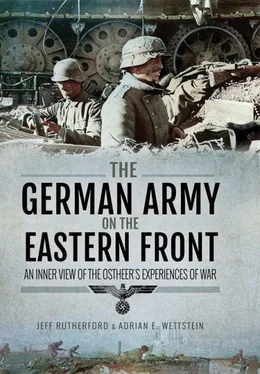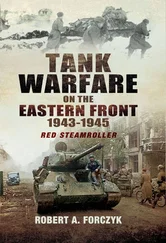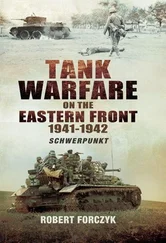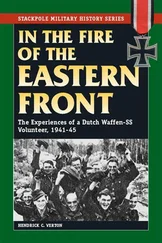Before the first improvement of the prisoners of war’s lots, the number of deserters had shrunk to 2-3%. After the better treatment became known, six months later it was already 17%. The proportion continues to increase. The fundamental order Nr. 13 (7. I.D. Ic Nr. 1177/43 geh., from 7.5.43) particularly emphasized a preferential treatment of deserters. This issue continues to have importance attached to it, and it will into the future as well. We must see in every deserter a future soldier for the Vlasov Army, who will help us fight, or at least be a worker who produces our weapons and ammunition.
If this thereby promotes the undermining of Russian military strength and at the same time delivers missing workers to our economy, the troops will have saved much blood in this way.
The campaign ‘Russians desert to Russians’ is underway. It is to be continued with all means. Its effect was weak at first, an increase is to be recorded. Its true effects will be displayed during future operations. The collaboration of the troops is to be constant and by all means necessary.
Prisoners of war and deserters are not stay with the troops in any case. According to the respective orders, they are to be sent to the division. Their quick passing on to collection camps is prepared.
In respect to the care and relief of our own industry, they are to be left their cooking plates, mugs, spoons, clothes, boots, etc. The confiscation of these things by the troops requires articles to be newly made in the Heimat and shipped on the long transport routes. They burden the means of transportation that is already continually strained through supply for the combat troops and troops going on leave.
The troops need to be made urgently aware of these things.
3) Captured Goods
The front cries out for weapons and equipment. Both are dependent on the availability of enough workers and sufficient raw materials (including scrap material). Presently, large amounts of weapons and equipment flow into newly established units so that sometimes our needs cannot be immediately and completely covered everywhere. We are therefore quite dependent on captured goods for this year. If the combat troops take what they need, then it doesn’t count against the replenishment of its authorized strength. All accumulated goods of all types should not be left behind to deteriorate but instead they need to be reported through the channel to the divisional staff officer for weapons and equipment. The assistance of all soldiers, especially unit commanders, is absolutely necessary in consideration of its decisive importance. Russian 7.62 cm field guns and cannon and 20/30 howitzers [43]will be supplied to other fronts for deployment. Rubber-tired wheels from artillery pieces and vehicles are in no case to be taken away. […] Not only are complete weapons important, but so is each individual piece for the repair of already available weapons.
Even the simplest soldier must know that nothing is worthless. Unnecessary destruction is to be absolutely avoided. Previous collection actions have brought undreamed of success.
In addition to this, it must again be pointed out that the soldiers’ dealings with the weapons, equipment, and clothing entrusted to him leave much to be desired. There is not one Russian village in which there aren’t dozens of civilians running around with pieces of German clothing (socks, sweaters, boots, underwear). The assumption that torn clothing is no longer usable is incorrect. 2 pairs of completely torn socks are as good as a new pair.
The continual repeated instruction of the troops as well as the responsible rank’s supervisory authority must start here and be put swiftly right.
This order is to be destroyed after perusal by the regimental and independent battalion commanders. It is to be only passed on orally to battalion commanders by the regimental commanders.
The flip side of mobilizing the population and its resources for war was ensuring that the population did not impede the German war effort. By late 1943/early 1944, the Soviet partisan movement had evolved into more than an irritant. It threatened the lines of communication in the rear areas, and it also became an increasing worry for the troops at the front. In response to this, Hitler and the OKW issued an order in December 1942 that demanded the army use any and all means to defeat the insurgency. By early 1943, the order had worked its way down the army’s hierarchy to the divisional level. [44]
Reports submitted to the Führer [show] that individual members of the Wehrmacht who have been deployed in the fight against gangs have been later called to account due to their behaviour in combat.
Concerning this, the Führer has ordered:
1) In combat against gangs, the enemy employs fanatical, communist-schooled fighters, who shrink from no outrage. More than ever, this is about to be or not to be. This struggle no longer has anything do with soldierly chivalry or with the agreements in the Geneva Convention.
If this struggle against the gangs both in the East and in the Balkans is not conducted with the most brutal of means, the available forces will no longer suffice to master this plague in the foreseeable future.
The troops are therefore authorized and obligated to apply in this combat any means without limitation even against women and children if it will only lead to success.
Considerations, no matter the sort, are a crime against the German Volk and the soldiers at the front who have to bear the results of the gang attacks and who can have absolutely no understanding for any mercy towards the gangs or their followers.
These principles must also rule the application of ‘Combat Directive for Anti-Partisan Warfare in the East.’
No German deployed in anti-partisan warfare will be called to account either for non-judicial punishment or with a court martial due to his conduct in the struggle against the gangs and their followers .
The commanders of the troops deployed in anti-partisan warfare are therefore responsible that:
all officers in subordinate units are promptly instructed about this order in the most emphatic way;
their legal advisors immediately receive notice of this order;
no judgments shall be confirmed that contradict this order.
In many ways, this order only sanctioned what was already occurring on the ground all across the front. Such practices, however, were not the only ways in which the army responded to the growing insurgency. The following January 1943 report by the 207th Security Division provides a snapshot of the problems faced by this unit and how it responded to them. [45]
General Situation:
I) Estonia: Cases of sabotage against telephone lines have recently increased. In some cases, it could be simple thievery, as sabotage cannot be irreproachably proven.
Flares have again been observed in connection with enemy aircraft incursions.
Scattered enemy air incursion planes have also dropped bombs without, however, causing any appreciable damage.
A larger fire broke out in a horse stall in the horse rehabilitation home in Värska […] in which considerable damage was done to the horses. Presumably sabotage, an investigation is underway. Otherwise, the situation is unchanged.
II) Russian Area
a) Field Commandant area Gdov: At the end of the reporting period in Field Commandant (V) 611 Gdov, further scattered appearances of small troops of plundering gangs, 12–20km northeast, east and southeast of Polna.
Increased incursions of enemy aircraft, flares are also seen at the same time. Bombing from the planes was also noted; however, they fell in open terrain and caused no damage.
The train station in Gdov (a wooden shed) burned down. Cause: presumably a defect in the chimney.
Читать дальше






![John Stieber - Against the Odds - Survival on the Russian Front 1944-1945 [2nd Edition]](/books/405234/john-stieber-against-the-odds-survival-on-the-russian-front-1944-1945-2nd-edition-thumb.webp)





